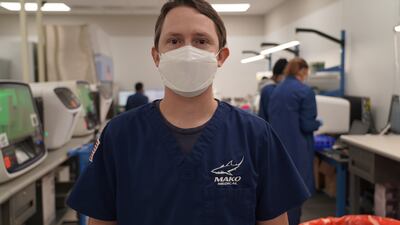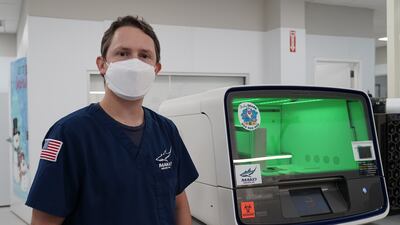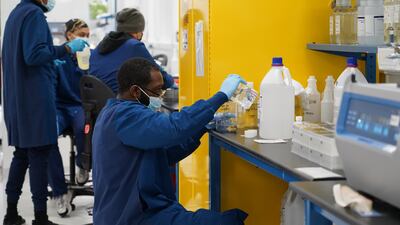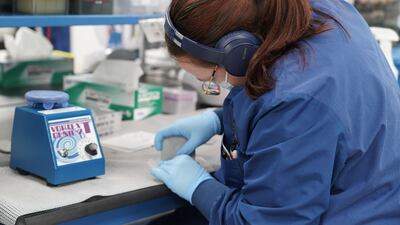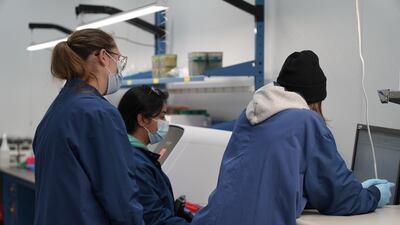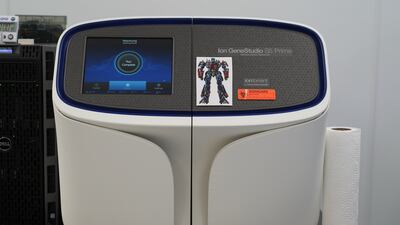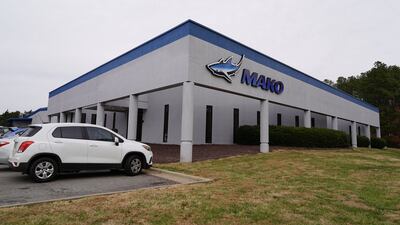Live updates: follow the latest news on Covid-19 variant Omicron
Inside a sprawling facility in Henderson, North Carolina, dozens of scientists in full medical scrubs sort through positive Covid-19 tests from across the country, searching for the B1.1.529 variant, better known as Omicron.
The cavernous 930-square-metre lab is the biggest single-site testing facility in the US and the frontline of America’s fight against Covid-19, which has killed about 800,000 Americans so far.
Located in a rural area of the state, Mako receives thousands of FedEx packages filled with PCR Covid-19 tests per day. The packages are catalogued and each individual test is registered. From there, the samples are put into batches and processed.
“It’s been pretty hectic,” said Matthew Tugwell, director of genomic Sequencing at Mako Medical Laboratories.
The lab is constantly buzzing with activity with up to 50 people on site at any one time, extracting samples and running tests against the continual hum of machines. Scientists and technicians work in three eight-hour shifts, 24 hours a day.
Before the pandemic the team was just a handful of scientists and now they number 150 strong.
Currently, the lab processes about 30,000 tests daily but has the capacity to do up to 150,000 per day.
The North Carolina site is one of more than 60 national reference laboratories in the US that work with the Centres for Disease Control (CDC) in Atlanta to search for new variants of coronavirus.
Each confirmed Omicron case they find is shipped to Atlanta, for further study and for testing the efficacy against various vaccines.
So far, the Mako scientists have found four individual cases of Omicron from the US states of Colorado, Georgia, Pennsylvania and Maryland, not nearly enough to fully understand the variant.
With only a few samples to study, the CDC must largely rely on the work of other countries to learn about the variant, making each sample they receive crucial as lives depend on them.
“There’s not that many samples currently,” Mr Tugwell told The National. “So, we're able to contribute to that effort by providing the samples.”
The variant, first detected in South Africa, has spread rapidly around the globe. Fifty-seven countries have confirmed cases of Omicron and it has been found in 19 US states.
As scientists around the world scramble to learn more about the variant and its potential dangers, countries are once again doubling down on certain Covid-19 restrictions, with many banning flights from southern Africa and enacting stricter testing requirements.
How genomic sequencing works
Scientists extract the RNA from positive samples that are then converted into into another type of DNA, known as cDNA, which is run through a series of high-powered machines that prepare the cDNA libraries and format them in a way that allows them to be sequenced.
The cDNA material is loaded on to small, plastic chips filled with millions of tiny wells that store the material, which is then put through a sequencing machine. The results are then analysed by a team of scientists.
The results show the genetic makeup of the virus and allow scientists to examine how and if it has changed over time. In the case of Omicron, scientists are looking for a specific marker known as an “S-gene drop out".
The CDC is relying on labs to be the tip of its spear in virus detection, keeping a close watch on which variant is behind the most cases in the US at any given time.
At Mako, the whole process from start to finish takes between two to three days, a time-consuming and costly process.
For Mr Tugwell, the long hours and hard work are all worth it, as he knows he is at the vanguard of America’s efforts to fight the virus.
“Having that direct positive impact on people's lives is very motivating,” he said.

